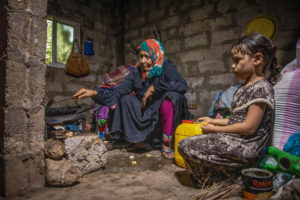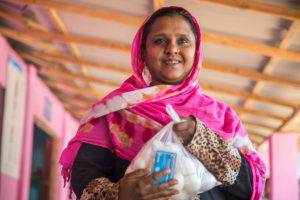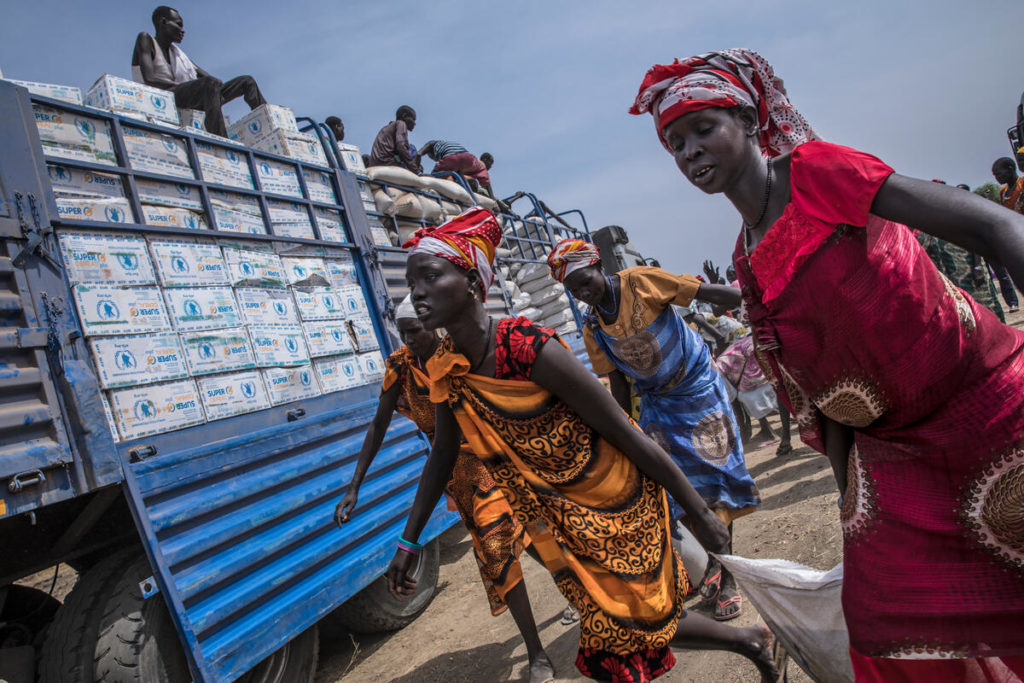The UN World Food Programme (WFP) has been awarded the Nobel Peace Prize 2020. The prize acknowledges how hunger is connected to peace and provides momentum for the global community fighting hunger in the important years ahead.
135 million people suffer from acute food insecurity today, which means their lives or livelihoods are in immediate danger because they are unable to access adequate food. At the same time, more people than in the past two decades are enduring violent conflict which, according to the World Bank, drives eighty percent of humanitarian needs such as food, shelter and sanitation in emergencies. Evidence linking food insecurity and conflict continues to increase.
It is within this context that WFP was awarded the Nobel Peace Prize 2020 “for its efforts to combat hunger, for its contribution to bettering conditions for peace in conflict-affected areas and for acting as a driving force in efforts to prevent the use of hunger as a weapon of war and conflict”. By awarding WFP the Peace Prize, the committee turned media attention to the increasing hunger and humanitarian needs in the world. “The award puts the struggle of the 690 million people who go to bed hungry at the centre of the world’s attention, provides a platform to amplify their voices and creates momentum to mobilise support,” says Rebecca Richards, Director, Peace and Conflict Office, WFP
We are deeply humbled to receive the #NobelPeacePrize. This is an incredible recognition of the dedication of the @WFP family, working to end hunger everyday in 80+ countries.
Thank you @NobelPrize for this incredible honor! pic.twitter.com/bHcS0usWQa
— Cindy McCain (@WFPChief) October 9, 2020
This year’s Peace Prize was also a way for the Nobel Committee to highlight the importance of multilateral cooperation for peace and stability, in line with Alfred Nobel’s will. “Awarding the Nobel Peace Prize to WFP represents renewed hope in the multilateral system, at a time when the COVID-19 pandemic is putting it at test”, says Richards. WFP is one of the biggest humanitarian organisations in the world, working in more than eighty countries and often in the middle of conflicts. Therefore, WFP has the potential to contribute indirectly to peacebuilding, as well as strengthen the local organisations that are there before WFP arrives and after WFP leaves.
“The Nobel Prize highlights the very important contributions that WFP is making to the prospects of peace, which are not always immediately visible and, of course, highly contextual. Ultimately, food security is foundational to human security”, says Caroline Delgado, Programme Director, Food and Security, at the Stockholm International Peace Research Institute (SIPRI).
Contributing to the prospects of peace
SIPRI and WFP entered a partnership in 2018 to investigate the connections between hunger and conflict as well as WFP’s contribution to the prospects of peace. That conflict causes hunger is well researched and established. However, the other way around, how hunger causes conflict, is neither as established nor researched.
However, through the partnership, their research has highlighted evidence that hunger can produce grievances that can escalate into instability and armed violence. This can happen through a range of pathways, with factors such as spiking food prices, access to water and land, and climate-induced shortages. Poverty-based food insecurity can also give individuals incentives to join armed rebellions that secure production resources such as land and financial assets for themselves.

“What is really important when considering these different pathways leading from conflict to increased food insecurity – or from increased food insecurity to conflict – are that they are complex and unique to each case, not least because there are so many underlying causes of both food insecurity and conflict”, says Delgado.
In the research that has so far been published from the SIPRI and WFP partnership there are five broad areas where WFP seem to be actively contributing to peace; these are livelihood investments, support for public service delivery, natural resource management, community-based participatory approach and general food distributions.
“What particularly stands out from our research is the way in which WFP delivers its assistance, creating the space for communities to come together and to start building and restoring relations and social cohesion,” says Delgado.
There is a risk that WFP can exacerbate conflict or increase the risk of conflict in some of its operations, therefore there is a need for WFP to even further include conflict sensitivity in its programming and design interventions to intentionally contribute to peace systematically across the organisation. Delgado added,
“contributing to the prospects for peace also requires long-term planning beyond the normal project cycle, as peacebuilding can take generations”
WFP looking towards the future
WFP has provided food assistance for over sixty years, and its methods have sometimes been met with criticism. This has mainly focused on WFP’s sourcing of food that hampers local food markets and WFP’s agreements to tie humanitarian donations to purchasing contracts with major donors. However, WFP’s work has started to change, and they have pledged to source more food from local markets and are increasingly using cash-based assistance. Rebecca Richards emphasises this and states that WFP recognizes that to end hunger it is not enough to simply deliver food or cash to meet urgent needs. Efforts need to be taken to reduce the reliance of people on external assistance.
“In Niger, WFP has worked with the community to sequence and layer interventions in a way that reduces the need of external assistance gradually over time. Bundling humanitarian and development activities means that local communities have access to food alongside livelihoods, while building a system with the right policies and governance framework that become sustainable and independent over time”, say Richards.
There is now a window of opportunity created by the Nobel Committee for those fighting global hunger. The Prize does not only come in a time of uncertainty with increasing hunger and conflicts and the unfolding COVID-19 pandemic; it also gives momentum ahead of 2021 that will see the world’s first Food Systems Summit. Even if all conflicts would end today, hunger would still exist. The issue of hunger is complex and caused by many failing aspects within the modern food systems. This is why hopes are high for the outcomes of the Food Systems Summit.

“The COVID-19 pandemic has shown the fragility of the global food systems and the need to make them more equitable, sustainable and resilient to nutritiously and sustainably feed 8.5 billion people by 2030. Transforming the food systems is now being recognized as one of the greatest opportunities we have to achieve the SDGs”, says Richards.
In addition to building peace, Richards highlights three things that need to happen for a sustainable transformation of our food systems, taking advantage of the current momentum: Invest in/ empower people and innovation to building lasting sustainable solutions; mobilize the necessary resources; and renew the commitment to inclusive multilateralism. It is only through a collaborative and multi-stakeholder way of working that Zero Hunger will be possible to achieve.
“Global problems require global solutions. In this context, Swedish input and leadership is necessary to tackle hunger and its contributing factors such as conflict, climate change, weak economies, and now COVID-19”, Richards concludes.
Written by Jonathan Eng, Network Coordinator at SIANI
